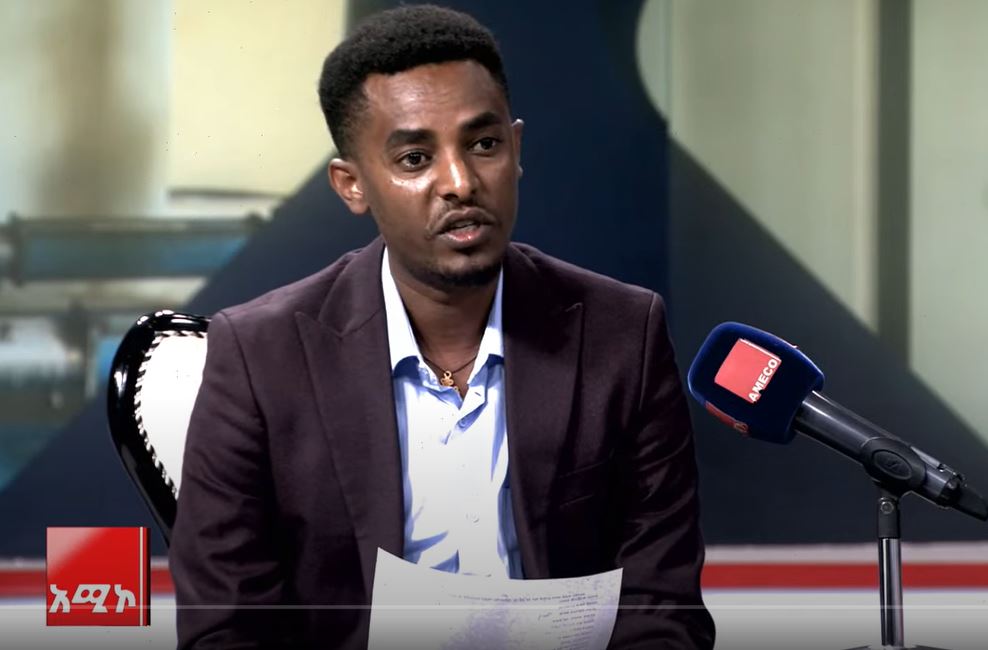IRC WASH Ethiopia, in collaboration with the Amhara Water and Energy Bureau and the Amhara Media Corporation, is utilising media to spread WASH messages and advocate for change.
Published on: 23/05/2024
Tsadiku Alamirew, a journalist at Amhara Media Corporation, is making waves with his biweekly television programme focusing on water, sanitation, and hygiene (WASH). Assigned by Amhara Media Corporation to produce WASH-centric television content, Tsadiku is developing eight episodes in partnership with IRC WASH and the Amhara Water and Energy Bureau and with generous financial support from the Conrad N. Hilton Foundation.
Initially, Tsadiku's understanding of WASH was limited. The news items and documentaries he and his team produced typically highlight challenges related to water. They look at issues like water tap breakage and the lack of access to drinking water, without exploring holistic, long-term solutions. However, since embarking on this project, Tsadiku has gained invaluable insights by interacting with WASH sector experts, understanding the complexity of issues, and recognising the need for collaboration among all actors and holistic system strengthening.
Now, Tsadiku advocates for collaboration between WASH actors and the media to raise awareness among communities, government and non-government entities, and the private sector. He encourages other media organisations in the country to engage with the WASH sector, promote achievements, and seek solutions.

Tsadiku hosting in one of WASH focused television programmes
This media initiative is part of the Hilton Renewal Grant, aimed at bolstering the Sustainable WASH Programme (SWP) in three districts of the Amhara region: Dera, Farta, and North Mecha. Since 2019, these districts have been implementing long-term WASH master plans with technical support from IRC WASH, which includes management information systems (MIS), WASH budget and expenditure tracking, and capacity building. Recently, IRC WASH has also supported these districts in developing resource mobilisation strategies to better implement their master plans. Another highlight was establishing a regional WASH-IWRM coordination platform. Additionally, the Hilton Renewal Grant planned to use media as a platform to discuss WASH topics and raise awareness among all actors.
To date, Tsadiku has produced five television programmes on various WASH topics such as financing, coordination, solarisation for community water supply, service sustainability, and urban sanitation, three of which have been broadcast so far. These programmes have provided him with a comprehensive understanding of the WASH system, its challenges, and potential solutions. Even though there were plans to film on-location documentaries, security issues in the area have made it necessary to have studio-based discussions instead. Short promotional messages and news items are broadcast ahead of each programme to engage the audience.
Mamo Yalew, from the Amhara Region Water and Energy Bureau, participated in one of the TV programmes and received positive feedback from viewers, underscoring the approach's effectiveness in reaching a broad audience. In addition to experts from the Regional Water and Energy Bureau and Health Bureau, other participants included experts from IRC WASH, WaterAid, CARE, and the Millennium Water Alliance. They shared their expertise during the discussions.
The success of the media approach was highlighted during a recent learning dissemination workshop of Hilton Foundation-supported projects in Amhara, where participants praised the initiative and stressed the importance of media collaboration. Suggestions included extending the approach to using posters, brochures, and radio for those who don’t have access to television.
Looking ahead, IRC WASH aims to foster a culture of media engagement in discussing and promoting WASH topics. The hope is that other organisations will follow suit, raising awareness among communities, political decision-makers, NGOs, and the private sector, all of whom play critical roles in strengthening the WASH system. Media organisations are encouraged to dedicate airtime and space for WASH messages, ensuring sustained and widespread impact.
At IRC we have strong opinions and we value honest and frank discussion, so you won't be surprised to hear that not all the opinions on this site represent our official policy.